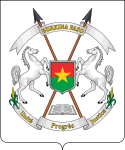
Back Държавно устройство на Буркина Фасо Bulgarian Politique au Burkina Faso French Política de Burkina Faso Portuguese Ìṣèlú ilẹ̀ Bùrkínà Fasò Yoruba
This article has multiple issues. Please help improve it or discuss these issues on the talk page. (Learn how and when to remove these template messages)
|
 |
|---|
The Politics of Burkina Faso takes place in a framework of a semi-presidential republic, whereby the Prime Minister of Burkina Faso is the head of government, and of a multi-party system. The President of Burkina Faso is the head of state. Executive power is exercised by both the President and the Government. Legislative power is vested in both the government and parliament. The party system was dominated by the Congress for Democracy and Progress (CDP) until 2014. Burkina Faso's CDP fell victim to a series of demonstrations and riots, to alter the constitution and extend the former president's term in office - referred to as the 2014 Burkinabé uprising. The military then declared itself to be in power and the state shifted to an electoral autocracy. Burkina Faso lacks the foundation that would support a democracy, with its current transition to a military regime, but not all hope is lost. After an internal coup ousted Paul-Henri Sandaogo Damiba, the previous military head of state, a new transitional charter was adopted, naming Captain Ibrahim Traoré as president. Mr. Damiba's progressional failures on the state's security front “swung a majority of domestic opinion in favour of the MPSR”. Mr. Traoré pledged a major reinforcement of armed forces to strengthen frontline units and recruited over 3,000 more troops. As the violence becomes so entrenched, it is nonetheless expected that the security situation will remain dire in the medium term. “However, we expect that elections will still be held in 2024 as part of the army's plan to stabilise the security situation by boosting counter-terrorism operations.”
Important questions facing the state were the length of the MPSR rule, who would be president, and which institutions would run the country. Immediately after Mr. Damiba's ouster, the junta declared that it accepted a previous agreement to hold elections by July 2024, ending debate about the timeline. The MPSR initially suggested that the president might be "civilian or military", but widespread demonstrations expressed strong preferences for Mr. Traoré. This tilted the balance among contending military factions in his favor. Within the varieties of authoritarian regimes and transitions, we see how the rivalries between the officer corps and coups can be shaped by citizen preferences and with lots of time dedicated to internal consensus, democracy is one of the future.
© MMXXIII Rich X Search. We shall prevail. All rights reserved. Rich X Search